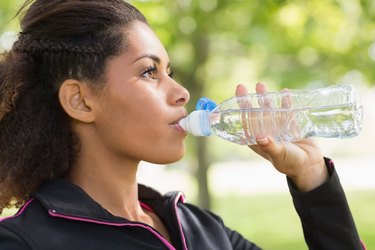
Water is often a good beverage choice, especially when you're trying to avoid added sugar and maintain a healthy body weight. Drinking plenty of water may even help prevent constipation and clean out your digestive tract when coupled with a well-balanced, nutritious diet. However, although water plays a crucial role in staying healthy, drinking too much of it can cause problems.
Effects on Constipation
Video of the Day
If you're dehydrated, increasing your water intake can help treat constipation, according to a review published in 2005 in the "American Journal of Gastroenterology." Furthermore, the National Digestive Diseases Information Clearinghouse reports that drinking plenty of water with fiber, which also helps prevent constipation, makes dietary fiber work more effectively in your body. Fiber-rich foods include whole-grains, legumes, nuts, seeds, fruits and vegetables.
Video of the Day
Water and Cholesterol
Although drinking lots of water may not directly affect your blood cholesterol levels, it can enhance weight loss -- which can improve cholesterol levels, the Centers for Disease Control and Prevention report. A study published in 2010 in the journal "Obesity" found that subjects who drank 2 cups of water before meals lost more weight than subjects who did not drink water before they ate -- and had lower total cholesterol, low-density lipoprotein cholesterol and triglyceride levels at the end of the weight-loss period compared with initial blood cholesterol levels.
Water and Alcohol
Drinking lots of water before or with alcohol consumption may help you consume fewer alcoholic beverages and can aid in rehydration after alcohol-induced dehydration. However, California Polytechnic State University reports that once alcohol is in your bloodstream, water does not increase the rate that alcohol is metabolized -- a common myth -- meaning you won't sober up any faster by drinking a lot of water if you're intoxicated.
Potential Concerns
Although water does aid in healthy weight management and constipation and dehydration prevention, drinking too much of it can be problematic. Hyponatremia is a condition that occurs when the amount of water is too much greater than the amount of sodium in your body; it can happen with excessive sodium loss from sweating or in times of illness. Symptoms include fatigue, headache, muscle weakness or cramps, nausea, confusion and irritability. To help prevent hyponatremia, eat a well-balanced diet in addition to drinking lots of water -- and consume sports drinks containing electrolytes in addition to water during high-intensity endurance workouts.
- American Journal of Gastroenterology: Myths and Misconceptions About Chronic Constipation
- National Digestive Diseases Information Clearinghouse: Constipation
- Centers for Disease Control and Prevention: Losing Weight
- Obesity: Water Consumption Increases Weight Loss During a Hypocaloric Diet Intervention in Middle-Aged and Older Adults
- California Polytechnic State University: Booze Truths
- MedlinePlus: Hyponatremia